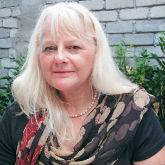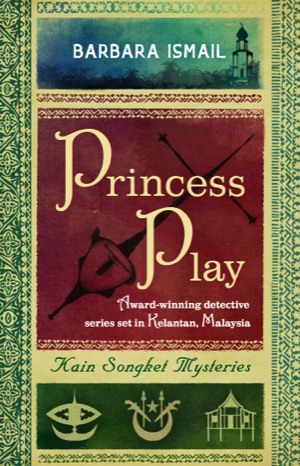
American author, Barbara Ismail, who spent several years in Kelantan, on Malaysia’s east coast, in the 1970s, has published the second book in her Kain Songket mystery series. “Princess Play”, like its predecessor, “Shadow Play” is set in that time period with a female sleuth as its heroine. Frances Wilks caught up with her in Penang on her recent book tour.
From Western City to Asian Kampong
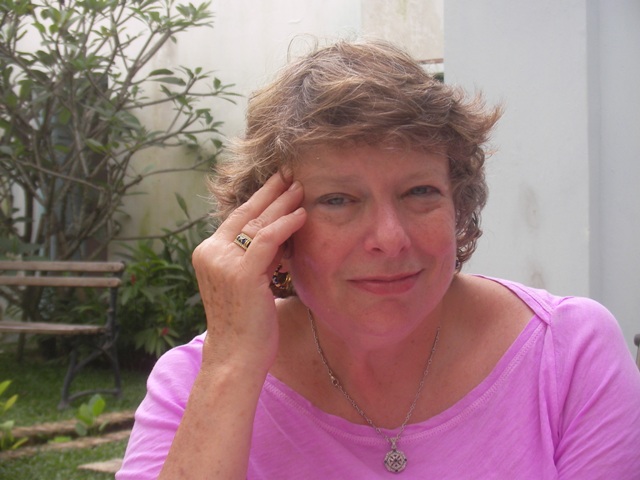
We meet, most appropriately, in one of the most beautiful gardens of George Town – at 23 Love Lane – where Barbara Ismail is staying with a Malay friend. She has known Malaysia, on and off, for nearly forty years, since she first lived here, as a young woman in the 1970s, doing field research work for her Ph.D. Coming from Jewish roots in cosmopolitan Brooklyn, New York, it must have been a culture shock, I muse?
“Well, yes, I had to learn to calm down, the pace of life in those days in rural Malaysia was slow. But that didn’t mean nothing was happening,” she says. In those days there was a rich cultural life in Kelantan, with wayang kulit (shadow puppet story-telling based on the Ramayana), the vibrancy of the market women who sold kain songket (silks), and the intensity of community life. “You were never alone in Kelantan, you sat on the steps of your kampung house, and people would come by for a chat. I was living with a family, they were so nice to me, so concerned about me, really amazingly lovely.” There was a wayang kulit performed somewhere in Kelantan every night and the atmosphere wasn’t that of hushed theatrical performance, but the constant movement of audiences eating, smoking, talking and watching. It must have been like a party. “Nowadays it’s different, story-telling isn’t really part of the culture anymore and the communal life – as with so many places – has collapsed under the onslaught of television. Everyone sits in their own house watching their TV sets, just like the rest of the world.” She has used these rich experiences of Kelantan life in her books.
Kelantan and its Powerful Women
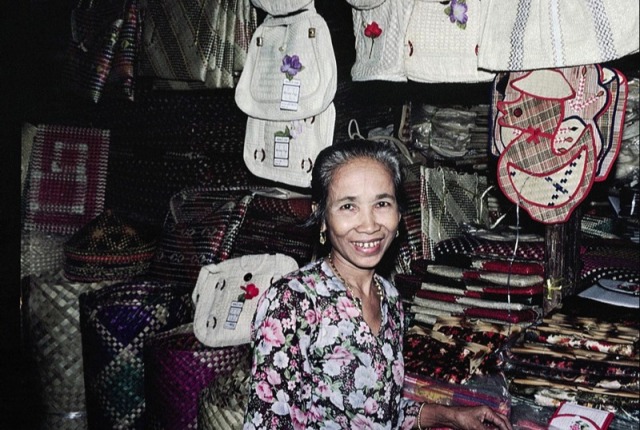
We talk about life on the east coast in those days. Kelantan tucked just under the Thai border, was part of that country until 1909 and shares much of southern Thailand’s cultural heritage. Its location and natural surroundings (the jungle to the south, the South China Sea to the east) cut Kelantan off from the rest of the peninsula, sometimes quite literally during the rainy season, when the East Coast usually fl ooded. Left to its own devices, Kelantan developed many arts and crafts, as well as food and language which are unique to the area, including wayang kulit, or shadow play with puppets.
Kelantanese people, like Mak Cik Maryam (the amateur detective heroine of the books), are quite proud of their culture and their reputation as ‘real Malays.’
A strong woman herself, Barbara clearly admires the strength and assertiveness of the women who were her friends. “Women rule the market, and their homes as well: men are not reputed to have good business sense, and for the most part they seem to accept it gracefully and retire to the coffee shops which surround any market. The divorce rate in Kelantan is quite high, the highest in Malaysia, and I believe it is in part due to women’s ability to earn their own living, and make their own way. They are women who take charge of their stalls and their lives, and live in no man’s shadow: Mak Cik Maryam, I hope, represents this tradition.”
An “Auntie” Sleuth and being Middle-Aged
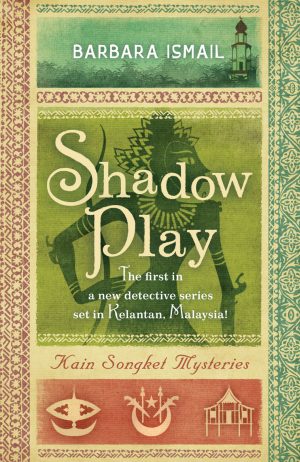
On the face of it a middle-aged Malay woman is perhaps not the most obvious choice for the heroine of a detective story. But Mak Cik Maryam (mak cik means “auntie”) is a surprisingly resourceful woman of intelligence with excellent social connections. When a fellow market woman is killed after a successful main puteri (princess play) curing ceremony, sorcery is suspected. But Maryam thinks that there enough human suspects to be investigated before considering the let-out of a supernatural cause. Solving the crime does, however, involve untying the knot of family secrets and lies as well as the application of some clear-headed common sense.
As the crepuscular shadows lengthen in the garden of 23 Love Lane, Barbara and her friend Puteri, who hails from Malacca and I, all women of a certain age, reflect on the importance of friendship and the freedom that maturity can bring the feminine sex. ‘Being the age I am now has given me the freedom to write,” says Barbara. “I don’t have to care what people think. I just write what I want to write. I don’t plan anything. I just create characters and let them get on with it. I didn’t know myself who did it – not until the end.” There are other freedoms, too. Barbara left academia to work in Citibank to create economic stability for herself and her two daughters. That’s how she met Puteri, who was also working for a bank, and raising her children in KL. “I handled the South East Asia banks and often we’d chat and now we’ve known each other all these years.”
A Feeling for Malay
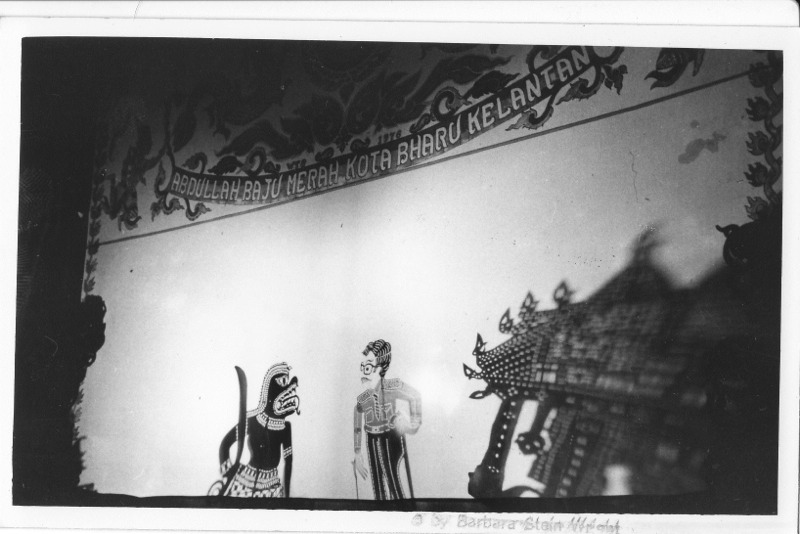
What comes across throughout the novels is a passion for the Malay language and culture. Barbara thoughtfully provides a glossary of Malay idioms (a taster version is given below). These give a window onto the Malay soul as idioms reflect the pre-occupations and essence of a people. Probably the fact that her former husband (they are now amicably divorced) was a Malay from Singapore also informs her understanding and her knowledge of the language and the culture.
But Barbara has now has plans to learn ancient Greek, so that she can read the Iliad in the original. When she has finished the Kain Songket series (and Songbird, with the same heroine is the next to be published), maybe we can look forward to some Homeric mysteries in the future?
Kain Songket Mysteries by Barbara Ismail
1. Shadow Play
2. Princess Play
3. Song bird
All published by Monsoon Books
www.monsoonbooks.com.sg
Malay Idioms
Anjing galak, babi pun berani
The dogs are ready and the boar is brave: a fight where neither side will back down
Berteh dalam kuali
Popped rice in a cooking pot: constantly talking
Hilam sepoh Nampak senam
When the plating is gone you can see the metal underneath: to see someone’s real character
Macam itik mendengarkan Guntur
Like a duck listening to thunder: having no idea what you’re seeing or doing
Seperti kucing dengan panggang
Like a cat and a roast: things that cannot be kept apart (like boys and girls)
Usul menunjokkan asal, Bahasa menunjokkan banga
Character reveals origins, speech reveals breeding
Homepage Highlight Photo Credit: Rebecca Marshall, Flickr
Source: Penang International February/March 2014
Read More Articles on Book Reviews:
- Book Review: Kuala Lumpur at War 1939-1945
- Book Review: Enchanting Borneo
- Book Review: Aviation at the Edge
What are your thoughts on this article? Let us know by commenting below.No registration needed.
"ExpatGo welcomes and encourages comments, input, and divergent opinions. However, we kindly request that you use suitable language in your comments, and refrain from any sort of personal attack, hate speech, or disparaging rhetoric. Comments not in line with this are subject to removal from the site. "

